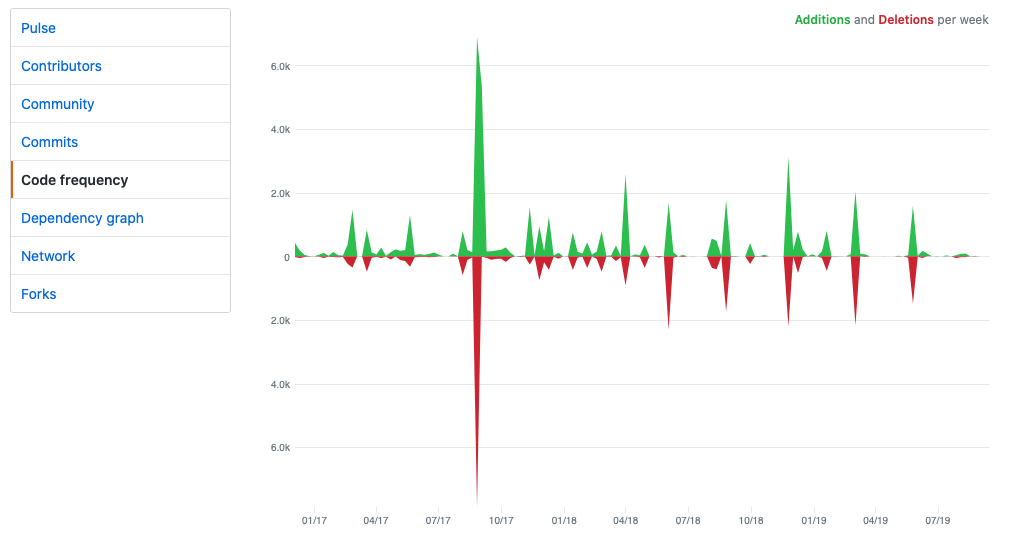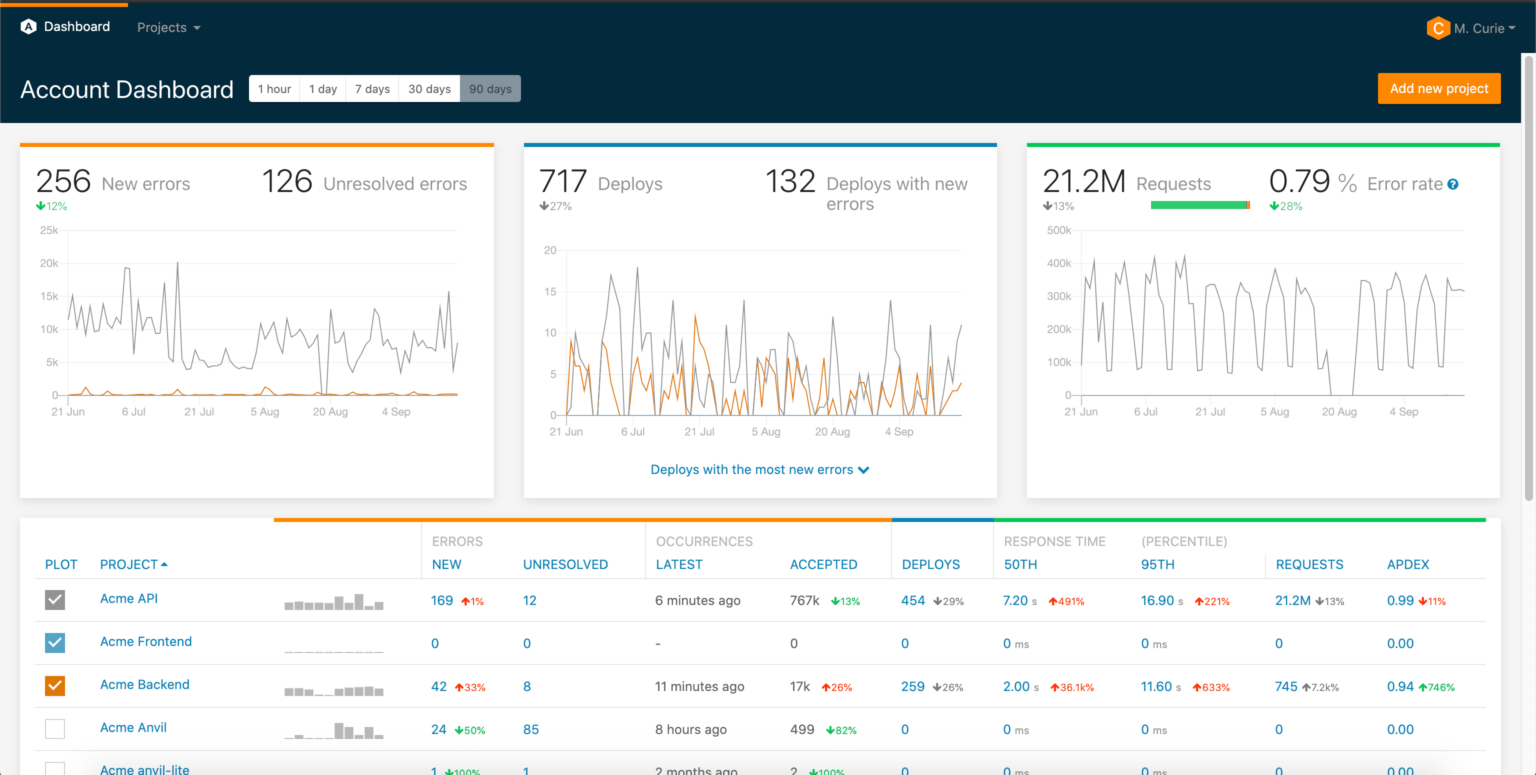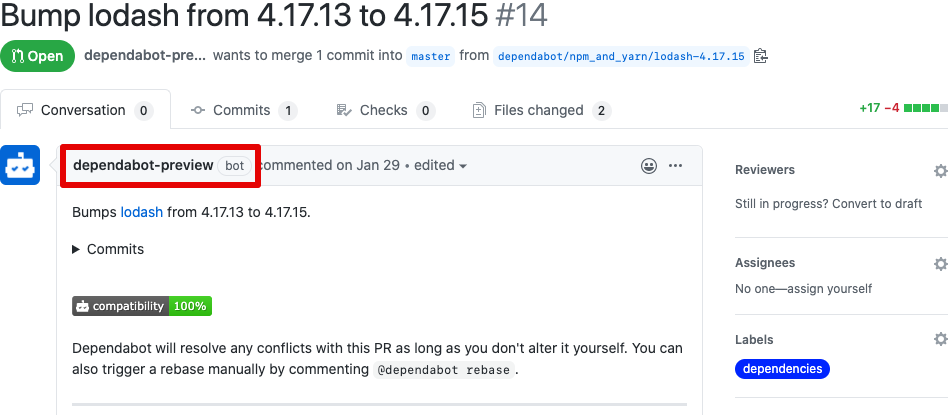Many businesses must balance code quality with delivery times. While you can measure delivery times, it's a little less clear how to measure code quality. Fortunately, there are several metrics that you can watch and strategies to implement. The key is taking the time to measure these metrics and leverage them to improve.
Let's look at essential quality metrics you should track and how they can help you deliver high-quality software.
Are you tracking software quality metrics? If not, here are three metrics that you can use to maximize quality. Share on XCode Churn: How Much is Changing?
Code churn is a metric that reflects how often a piece of code (e.g., a file or class) changes. While code inevitably changes over time, frequent changes are a symptom of miscommunication or inexperience. We consider it churn when code changes within three weeks. And, when code churn is 20% or more of your effort, it's time to worry.

GitHub makes it easy to see code change frequency. Source: GitHub
Several problems might cause code churn:
- Poorly written code. Developers that don't adhere to the single responsibility principle may create classes that do too much. And, those classes will naturally require frequent rewrites.
- Poor communication. Developers that don't understand requirements may have to rewrite code multiple times until they get it right, resulting in significant levels of code churn.
- Excessive complexity. Overly complex code is likely to break more often and require updates. Unfortunately, complicated code is often mission-critical, making it a significant problem.
You can measure code churn using git, a common code repository tool, or tools provided by cloud platforms, like Azure DevOps. When you see excessive code churn, talk with developers to find the root cause and address the problem before it spirals out of control. By doing so, you can dramatically improve code quality and avoid costly rework.
Defects: How Many Errors Occur?
Defects are application errors that affect users. While test-driven development minimizes errors, it's impossible to simulate real-world conditions perfectly and catch every defect before production. The most common production errors arise from real-world data (e.g., production databases) and users (e.g., unexpected behavior or scale issues).
Application performance management (APM) tools make it easy to track the number of defects reaching production. Of course, a higher number of defects translates to lower-quality software, making these tools essential for measuring and optimizing quality. The worst defects can even lead to application downtime—another measure of quality.

Airbrake makes it easy to monitor errors in production. Source: Airbrake
When errors arise in production, development teams should take the time to analyze the defect, determine the root cause, fix the immediate issue, and establish systems to prevent similar problems in the future. You may also want to consider more stringent regression testing and continuous integration to ensure quality with each deployment.
Dependencies: Are They Up-to-Date?
Most modern applications rely heavily on dependencies. After all, you cannot be an expert at everything. For example, it's almost certainly a bad idea to develop your own authentication and authorization system due to the sheer number of security considerations. But, of course, the trade-off is that you are trusting a third party with a critical part of your application.
The good news is that many dependencies are highly reliable. Maintainers quickly fix the problem and deploy a new version if there are any issues. But, the bad news is that many development teams are terrible at keeping their dependencies up to date. And, these outdated dependencies can cause a range of problems—from errors to security vulnerabilities.

Dependabot solves a lot of problems. Source: GitHub
GitHub's Dependabot and similar tools make it easy to keep your dependencies up-to-date. For example, Dependabot creates a pull request to update the dependency when a security vulnerability is detected. Although, of course, there are some instances where you must make more significant changes to accommodate updated dependencies.
How to Improve Code Quality
The best way to improve code quality is by hiring experienced developers and effectively communicating with them. For example, you might use behavior-driven development (BDD) to communicate new features and test-driven development (TDD) with CI/CD to ensure that code passes objective tests before reaching production users.
Standards can also help improve code quality by making it easier to read and understand. For example, you might use HoundCI or static code analyzers to flag code quality, security, or style issues. Similarly, you might use pair programming to ensure that the team remains on the same page regarding style and approach.
If you're looking to level up your development team, we provide team augmentation services. Our senior-level engineers will join your team to improve code quality, mentor junior developers, and ensure that your application performs well at scale.
Contact us for a free consultation!
The Bottom Line
Software businesses should track quality metrics and constantly improve them to deliver the best product to consumers. High-quality software also cuts down long-term costs, minimizes technical debt, and improves performance, creating multiple benefits to the bottom line. The key is taking a systematic approach to the process.
If you need help building a roadmap, augmenting your team, or building a full application, our team of experienced software engineers can help you from start to finish. Learn more or contact us for a free consultation.



